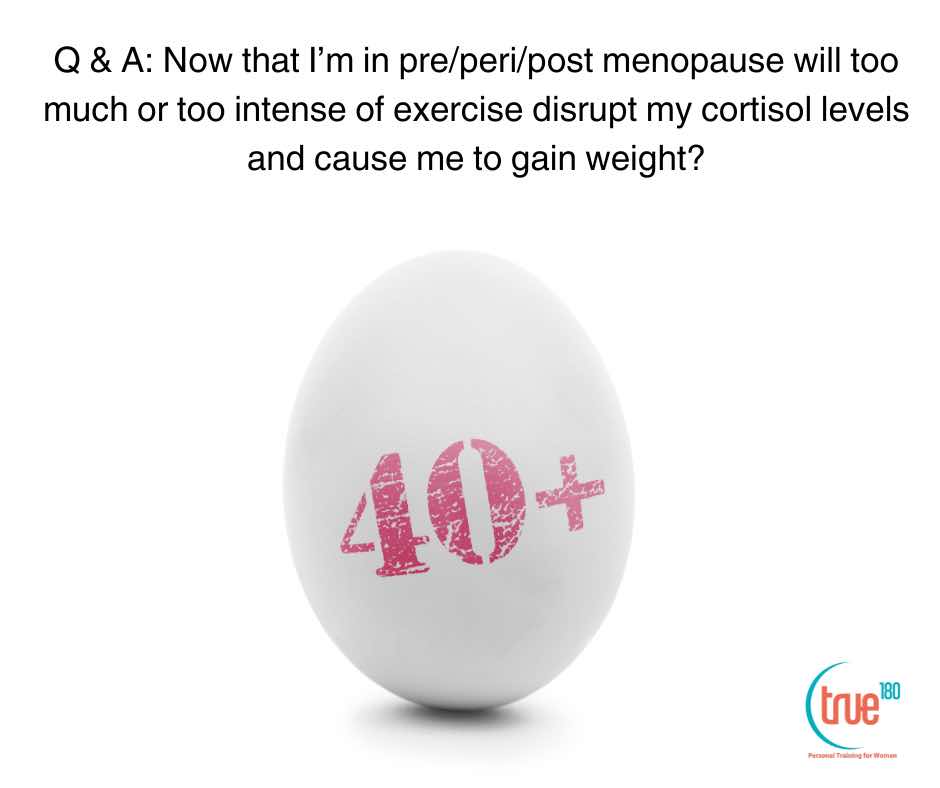Q & A: Now that I’m in pre/peri/post menopause will too much or too intense of exercise disrupt my cortisol levels and cause me to gain weight?
A: No, and hell no. The opposite is true:
- Exercise (that makes you sweaty and tired) is more important than ever during menopause for a variety of reasons that include reducing the amount of fat gained in the midsection, preventing bone loss, promote joint health* and maintaining sanity.
- Cortisol helps your body mobilize and burn it’s stored fat.
- Removing cortisol from your body drops your resting metabolism by about 10%. (Yep.) In other words if you turned off your production of cortisol that would cause weight gain.
- We all need cortisol to function and be healthy. Too little is what you have in a life threatening disease such as Addison’s disease.
*As estrogen levels decline most women’s joints start to hurt more, and moving them through as full a range of motion as possible helps improve lubrication (synovial fluid) which helps your joints feel better and be healthier…. Exercise is more important than ever.
Cortisol is not evil
Here’s a quote from a British doctor that summarizes and promotes the wealth of misinformation about menopause, cortisol and body-fat:
“An increase in cortisol (your stress hormone) causes the body to release glucose for energy. If this energy is not used it is laid down as fat.”
This quote is almost completely false. The reality is:
- Cortisol mobilizes carbs (glucose) and fat and protein.
- Carbohydrates are stored as carbohydrates not fat. We store fat as fat.
- Your liver can convert carbohydrates to fat, but, it is very slow. Even when researchers gave women the equivalent of 3.2 liters of soda (almost a gallon of regular soda) a day, their livers were only able to make 10 grams of fat per day. Meaning it would take over 45 days of this level of soda intake to make 1 pound of fat.
- New body fat is the result of eating more fat than you burn in a day. It does not come from the carbohydrates released from your muscles and liver when your body needs extra energy. The leftover carbs from your muscles and liver go back into storage as carbohydrates (glycogen if you want to be nit-picky).
- When cortisol mobilizes fat this is your stored body fat, which means cortisol gives you an opportunity to burn some of it up, which is a good thing.
- Cortisol, and other stress hormones, help your body burn more calories, which is also a good thing.
Prednisone, methylprednisolone, and other (non-performance enhancing) steroids are synthetic cortisol. Doctors give these to people because cortisol is a powerful anti-inflammatory. Used prudently* these are life-saving drugs.
*As with all things there can be too much of a good thing. Long term use of (cortico)steroids causes problems like osteoporosis, type 2 diabetes, tendinopathy, etc. However, this is only true for the huge doses possible from medication. Your body can’t make doses that large.
What’s Up With Menopause and Belly Fat
As you may have noticed: men and women are different. When a man gains weight it goes to his stomach, and a bit to his breast tissue. He’s going to gain a little bit on the rest of his body too, but it’s mostly in his gut and chest. Men don’t accumulate much padding in the hips and thighs because of their relatively low estrogen levels. With age this either stays the same, or gets more pronounced – the legs get skinnier and waist gets bigger.
My point is that the increase in belly fat with menopause has nothing to do with cortisol levels, and everything to do with declining estrogen levels. Even if you have the same total amount of body-fat you did 20 years ago, it will get distributed differently. As Debbie Downer would say, “’differently’ means that it’s going to move from your hips and thighs to your stomach, and (somewhat) to your chest.”
These shifts are the result of declining/changing sex hormones that are a natural part of aging. The only thing you can do to exert control over these hormonal shifts would be some sort of hormone replacement (HRT), and HRT has its limits in terms of how much and how long it can attenuate the normal aging process. (Consult your doctor for HTR medical advice.)
This might sound like doom and gloom, but I prefer the term reality because the truth will set you free. Denial feels good for a little while, but leads to massive frustration, disappointment and more. Even with accepting reality, there’s still plenty you can do:
- Work the muscles in your hips, thighs and back extra to help maintain the hip to waist/leg ratio that you prefer. (These muscles are also important for life in general.)
- Work at losing a little bit of body fat to help keep your waist at or about the circumference you’d prefer.
- Spend less time on social media so you have fewer unrealistic, photo-shopped, surgery and hormone enhanced women to compare yourself to.

